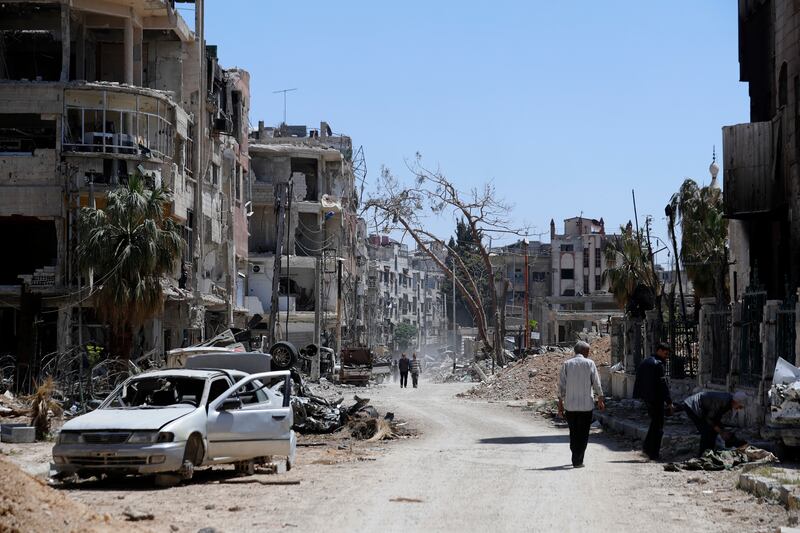A push by the world’s chemical weapons watchdog to stop supplies of dual-use material to Syria has refocused international attention on one of the most gruesome aspects of the country’s civil war.
The Syrian Foreign Ministry on Sunday condemned a recommendation by the Organisation of the Prohibition of Chemical Weapons to its members to restrict chemical transfers to Syria, describing it as “meaningless”.
The move compensates for “failed political campaigns” by western nations, such as the “fabrication of incidents of chemical weapons' use”, the ministry said in statement.
The OPCW move could undermine a drive by President Bashar Al Assad to re-engage with the international community, which was cut off following the outbreak of civil war in Syria in 2011.
Moscow’s intervention in 2015 helped to defeat a rebel offensive aimed at toppling the regime, eventually contributing to many Arab states restoring diplomatic ties with Damascus.
An OPCW decision, after a meeting in Geneva last week, said “the continued possession and use of chemical weapons by the Syrian Arab Republic ” have caused “serious damage to the object and purpose” of the international convention banning the weapons.
The organisation said Syrian authorities had failed “to submit an accurate and complete declaration and to destroy all of its undeclared chemical weapons and production facilities”.
The OPCW advised its approximately 190 members to “prevent the direct or indirect supply, sale, or transfer to the Syrian Arab Republic … of the chemical precursors and dual-use chemical manufacturing facilities and equipment and related technology”.
It also suggested they take “appropriate measures” to prevent Syria from being supplied with toxic material that may "contribute to the development, production, acquisition … transfer and use or threat of use of chemical weapons”.
A reported gassing of a rebel suburb of Damascus in 2013, the first large-scale use of chemical weapons in the civil war, led to mounting international pressure, which forced Mr Al Assad in the same year to join the Convention on the Prohibition of the Development, Production, Stockpiling and Use of Chemical Weapons and on their Destruction.
More than 1,400 were killed in the attack, which mainly targeted Ghouta on the eastern edge of the capital
Selim Namoura, a Syrian surgeon who was in the Ghouta district at the time and treated victims of the gassing, told The National the OPCW’s move would help Syrian campaigners in their drive to hold the regime accountable in western courts for its use of chemical weapons in the conflict.
“There should be a special international court to try the perpetrators of the chemical weapons attack in Syria,” said Mr Namoura, who last year set up an organisation based in Paris to represent the victims.
Last month, France issued an international arrest warrant for Mr Al Assad, accusing him of complicity in war crimes and crimes against humanity over the 2013 Ghouta gassing.
While the OPCW did not conclusively establish who was behind the Ghouta attack, it has concluded that Sarin gas was used.
Since then, Mr Al Assad's air force has used chemical weapons in rebel areas twice. The incidents, the OPCW said, were in Ltamenah in Hama governorate in 2017, which affected at least 100 people, and a 2018 chlorine gas attack on Douma near Damascus, which killed 43.
The OPCW also established that ISIS, which fought loyalist forces as well as rebel formations, had also used chemical weapons once in the Syrian civil war.
Dan Kaszeta, a former Pentagon chemical weapons expert and fellow at the Royal United Services Institute, said the OPCW cannot compel its members to follow its recommendations.
He added the organisation's decision was "partly useful" because "a lot of countries don't have the technical wherewithal to come up with this stuff on the comprehensive lists under their own steam".
He was referring to the organisation's work to identify substances and equipment that are not illegal but could be modified to make chemical weapons.
“Countries who are going to deal with Syria aren't likely to be swayed," Mr Kaszeta said.
----
Robert Tollast reported from Abu Dhabi






